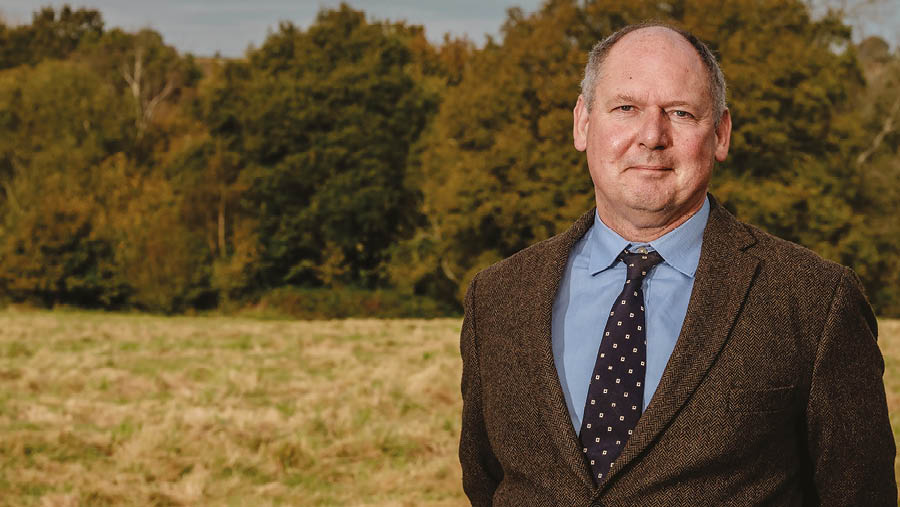
“When I raise the subject of wills and lasting powers of attorney [LPAs], I often get the ‘please-don’t-ask-me-that-look’,” he says.
“It’s a horrible thought, but what if someone has a car crash or an accident on the farm and dies or becomes mentally incapacitated?
“Additional confusion and grief will be layered onto what’s already a tragedy if the necessary paperwork isn’t in place.”
Financial and health LPAs are documents which give someone else legal authority to make decisions related to your money and your physical wellbeing if you become unable to.
“If, for example, the senior partner in a farm suddenly becomes incapacitated and no one has been appointed under a financial LPA, the bank accounts could be frozen, meaning the mortgage, the wages and even the food bills might not be able to be paid,” says Matthew, a director at Sussex-based CLM.
Importance of wills
“In the absence of a will, a farm can be torn apart by confusion and disputes after someone dies.
“If you want your assets – and the farm as a viable business – to pass down the generations in a specific way, you have to get a watertight will in place.”
Many farmers, however, haven’t completed this paperwork. This is particularly the case in the livestock sector and especially so in dairying, he says.
“Year-round, people are exhausted, so it can be hard to face the emotional challenges and decisions associated with LPAs and wills.
“There’s never an ideal time, but you should have them in place, well before you reach old age.”
It is not necessary to put both financial and health LPAs in place, it is a matter of personal preference whether to do one or both.
A further reason the task gets postponed is that even the most thoughtful, progressive farmers can find it tough to talk openly about ageing and dying, says Matthew.
Start conversations early
“For some people, the shutters simply come down. They just can’t face it.
“But if you start the conversation early, you normalise it so it doesn’t become taboo. It can be wise to start talking to the next generation about this even when they’re still in their 20s.
“Sometimes, too, one person in a relationship might be comfortable addressing these issues, but the other isn’t,” he adds.
“Also, some people just take the view: ‘I don’t know what to do about it, they can sort it out when I’m gone.’ But this approach rarely pans out well.
“Even where there is complete harmony within the family – which is quite rare – the spirit of amicability can dissolve. Circumstances change. People change.
“Harmony can rapidly disappear when money is at stake. And on a family farm, it gets more complicated if multiple siblings are involved and each has their own families.”
Meanwhile, for those who find themselves living with a serious illness, being open and communicating is also usually the best approach, he suggests.
Openness makes things easier
“I’ve seen situations where people have been diagnosed with cancer and haven’t wanted to talk about it because they don’t want to upset their loved ones or they fear it will destabilise the business.
“I completely understand that, but once you’ve started opening up, it makes planning so much easier.”
The danger, says Matthew, is that because it’s possible to continue working with many – even serious – conditions, the lack of an obvious impact on day-to-day life means the temptation can be to pretend that will always be the case.
“There’s no hard-and-fast rule about when is the best time to tell people about an illness, but it’s important to talk to everyone who matters.
“This obviously means family and friends, but you’ll ultimately have to tell everyone in your business who will be affected, too,” says Matthew.
“Effectively, this means anyone who you currently, or may need to, lean on. When somebody becomes unwell, the reality is it has a direct, knock-on effect on all those around them.”
Matthew’s experience
Matthew Berryman has first-hand experience of making decisions related to such complex issues, as he was diagnosed with Parkinson’s disease in 2009.
Now 58, it’s only been in the past couple of years, however, that it has presented him with some physical challenges.
He formally told his co-directors about his situation in 2021. “It felt important I was up-front with them.
I’m sure they suspected something was wrong, but I put some stability back into the relationship and could answer their questions, in as much as I knew the answers.
I was really relieved to have done it and the response was entirely supportive,” he says.

Consider how to share the information
“I opted to email them. It wasn’t that I was at all worried about talking to them, but I wanted to make sure I got the message across in the way I really wanted to.
Delivering news such as this is difficult, so I’d recommend thinking about whether you feel more comfortable doing it face-to-face or by letter or email,” he advises.
“People might need a bit of time to absorb the message, so a written communication can take the pressure off the sender and the recipient.
“I started having these conversations with clients at about same time and they have responded without exception in the same way.
Many have become good friends over the years and one had even previously actually commented that I was walking a little awkwardly.
I realised it was time to take a deep breath and tell people.”
Recently, Matthew and his wife, Sigi, updated their LPAs and wills.
“The lawyer asked the right questions and prompted us to think about matters that we hadn’t discussed before. The cost equates to about £1,000 a person, so it’s not cheap.
“But when you realise that they set out how your affairs are to be dealt with, either after you have gone or if you become incapacitated, they should be thought of as a worthwhile investment and not just a chore for a wet day that never comes,” he says.
“Picking the right lawyer is crucial,” he adds. “If you’re a farmer, find someone who understands agriculture because it is different to other jobs.
“They need to understand you and there needs to be mutual trust and respect between you.”
Insurance is an option
Matthew also suggests considering critical illness cover and life insurance.
“The monthly premiums do add up, so cost might be an issue. But the policies would kick in and pay in the event of you not being able to work or dying.
“Years ago, I considered doing this, but didn’t. I suppose when I was in my 30s I was a bit complacent.
“At that age, you think you’re going to live forever and, for most people, thankfully, serious illness is not an issue. But you never know what’s around the corner.”
Matthew is due to have a brain operation in June. The surgery aims to reduce involuntary movement which is a side-effect of the drugs used to treat his condition.
The operation has a 98% success rate but is a big procedure requiring a few weeks off work for recovery, so continuity plans have been put in place within the CLM team.
Peace of mind
“I’m looking forward to getting the operation behind me and carrying on with the job I love.
“But right now, knowing the correct paperwork is in place has given me some peace of mind and one less task to think about.”





















